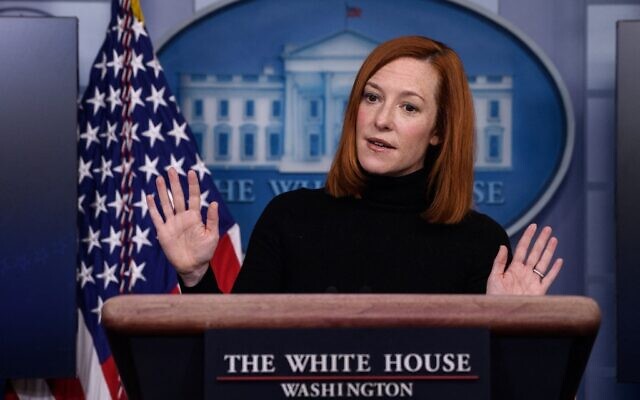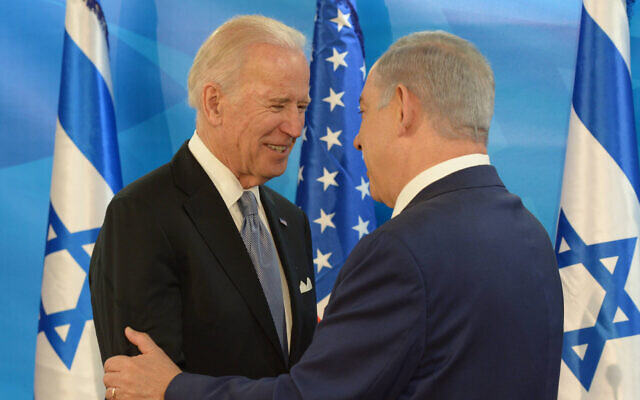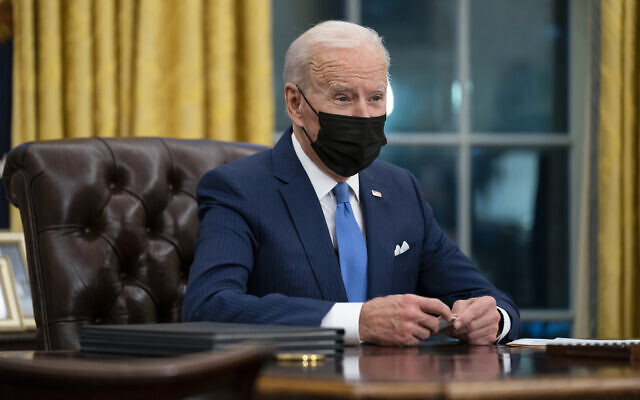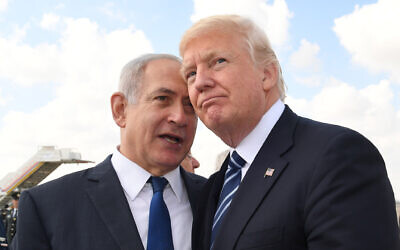US press secretary says ‘stay tuned,’ conversation will happen ‘soon’; touts ‘important strategic security relationship’ between the countries

US President Joe Biden’s first phone call with a Middle Eastern leader will be with Prime Minister Benjamin Netanyahu, the White House said Tuesday.
Press Secretary Jen Psaki told reporters the call will be “soon,” but said she could not provide an exact date. “Stay tuned,” she said.
The lack of a phone call between the two leaders since Biden took office last month has raised eyebrows in Israel and the United States, though the White House has said the new American president was not intentionally snubbing Netanyahu.
Psaki stressed that “Israel is of course an ally. Israel is a country where we have an important strategic security relationship, and our team is fully engaged — not at the head of state level quite yet, but very soon, but our team is fully engaged, having constant conversations at many levels with the Israelis.”

Her comments came a day after Netanyahu downplayed not receiving a phone call from Biden and insisted he would soon hear from the president.
Psaki was also asked during the press briefing about the administration’s stance toward Saudi Arabia, which forged close ties with Biden’s Republican predecessor Donald Trump.
“We’ve made clear from the beginning that we’re going to recalibrate our relationship with Saudi Arabia,” she said.
Psaki said Biden will speak with King Salman “at an appropriate time” and not with Crown Prince Mohammed bin Salman, the Gulf kingdom’s de-facto ruler, who has faced criticism from US lawmakers for his alleged role in the killing of journalist Jamal Khashoggi and Saudi Arabia’s military involvement in Yemen against Iran-backed rebels.
Psaki also said Biden has no plans to invite foreign leaders to the White House in the near future.
“It will be a couple of months before the president has an in-person or invites a foreign leader to meet in person here at the White House,” she said, citing the COVID-19 pandemic.
Biden preparing meticulously before phone calls
Twelve times since he took office last month, Biden has dialed up a world leader after reinstituting what was a long-held White House standard mothballed by Trump: Vigorous preparation.
The changes to telephone diplomacy have been about both style and substance as Biden has sought to send the message to foreign leaders — many embittered by Trump’s habit of berating his counterparts and conflating personal interests with US national security — that Biden is determined to reset the US relationship with the world.
As was the practice with past administrations, Biden advisers are typically preparing the president with a package of written background information, including summaries of recent developments in the country, a recap of previous interactions with the leader, talking points on issues to highlight, as well as “if asked” notes to help shape the president’s response to hot-button issues that his counterpart might raise.

James Carafano, a national security analyst at the conservative Heritage Foundation, said Biden with his first round of calls has been primarily concerned with sending the message that he’s turned the page on Trump. But Carafano argues that the new president has largely avoided detailing what that means in substance for US foreign policy.
“He hasn’t really gone beyond we’re going to work with friends and allies theme,” Carafano said.
Biden made clear his desire to return to diplomacy after Trump withdrew from the Obama-backed international nuclear deal with Iran. Netanyahu has cheered Trump on the issue and vocally opposed the 2015 deal.

In a Monday television interview, Netanyahu vowed to counter those who oppose his hawkish stance toward Iran when asked about the lack of call from Biden.
Netanyahu told Channel 12 he has “wonderful ties” with Democrats in Congress, after forging a close bond with Trump and feuding with former president Barack Obama over the terms of the 2015 accord limiting Iran’s nuclear program in exchange for sanctions relief.
Netanyahu said ties with US lawmakers were “a question of policy” and not partisan affiliation.
“Whoever supports our policies, I’m with him. And whoever endangers us, for example [on policies] regarding a nuclear Iran, which is an existential threat to us, so I oppose that, and I don’t care if it’s Democrats.”
Biden has said his administration will rejoin the deal with Iran if Tehran first returns to compliance with its terms.
Netanyahu has been a leading critic of the agreement, which was reached when Biden was vice president, and warned against reengaging with Tehran on the accord.
As reported by The Times of Israel
